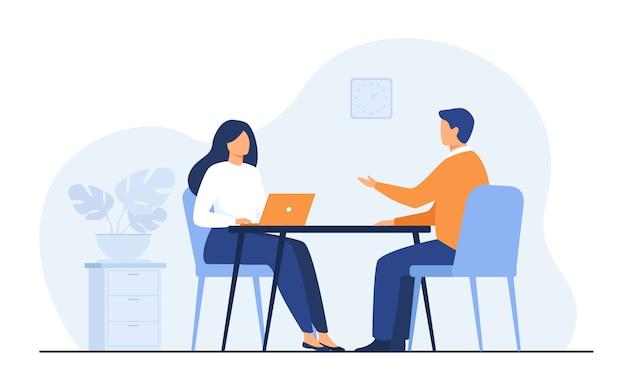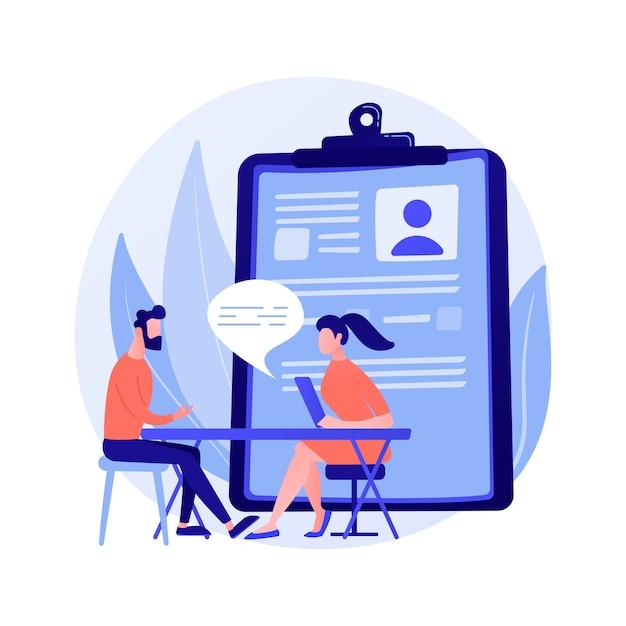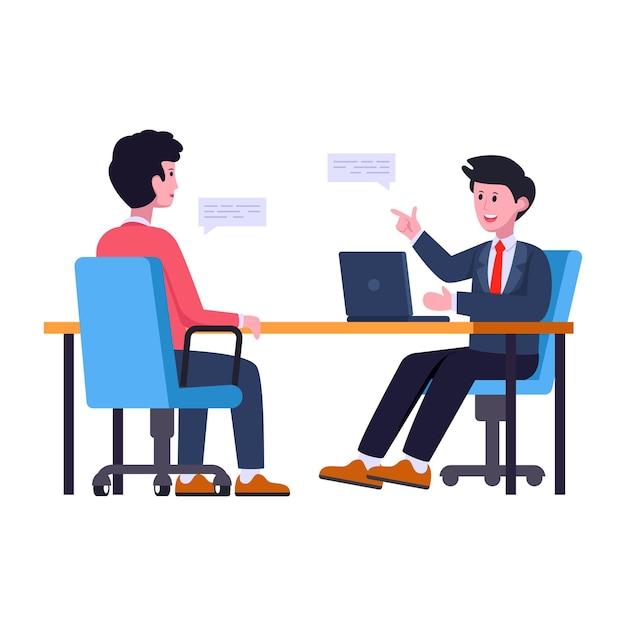Are you looking to elevate your interview skills and extract insights from subject matter experts (SMEs)? The expert interview technique is a powerful method that can help you to unlock valuable information from seasoned professionals across a wide range of industries and disciplines.
In this blog post, we’ll explore the essential elements of the expert interview technique, including what it is, how to prepare for it, and expert interview examples. Whether you’re a journalist, marketer, or researcher, these insights can help you to improve your interview skills and get the most out of your conversations with experts. So, let’s dive in!
The Interview Technique Tips No Expert Will Tell You
So you have an interview coming up, and you want to knock it out of the park. You’ve done your research, rehearsed your answers, and put on your best suit. But what about those little tips that the experts don’t talk about? Here are a few insider secrets that will take your interview game to the next level.
Eye Contact is Everything
It’s not just about what you say; it’s how you say it. Maintaining eye contact during an interview is critical, not only to convey confidence and sincerity but also to ensure that you actively listen and engage with your interviewer. Don’t stare them down, but make sure to maintain a natural and friendly gaze.
Mirroring Body Language
Some experts will tell you to study your interviewer’s body language and mirror it back to them. Sure, it can help build rapport and make you more likable, but it’s also a little creepy. Instead, try to match their energy level and tone of voice. People tend to feel more comfortable around others who have a similar energy level to their own.
It’s All About the Pause
When answering a question, make sure to take a beat before you reply. Not only does this show that you’re carefully considering your response, but it also gives you a chance to organize your thoughts and answer more concisely. This technique also works well if you’re not sure how to answer a question. Take a moment to gather your thoughts, and then give a thoughtful response.
Don’t Forget to Ask Questions
At the end of the interview, you’ll almost always be asked if you have any questions. This is your chance to show that you’ve done your due diligence and are truly interested in the company and the role. Ask thoughtful questions that show you’re invested in the position and eager to learn more. And remember, an interview is a two-way street—think of it as an opportunity for you to decide if this is the right fit for you as well.
Be Yourself
Above all, remember to be yourself. It’s easy to get caught up in trying to impress your interviewer, but they want to see the real you. Don’t be afraid to show your personality and let your unique qualities shine through. After all, they invited you in for an interview because they saw something special in you.
With these insider tips, you’re sure to ace your next interview. Remember to breathe, stay calm, and be confident. Good luck!
Expert Interviews
Have you ever felt like you’re stuck in a rut when it comes to your interviews? Like you’re always asking the same old questions and getting the same old answers? Fear not, my friend! I have just the solution for you: expert interviews.
What Are Expert Interviews
An expert interview is an interview with someone who is considered an expert in their field. It’s a great way to get insights and opinions from people who know their stuff and can provide unique insights that you might not get from a regular interviewee.
Why Should You Conduct Expert Interviews
Expert interviews are a great way to add depth and credibility to your content. By including expert opinions, you can make your content more informative and engaging. Plus, it shows your readers that you’ve done your research and that you take your content seriously.
Who Should You Interview
The sky’s the limit when it comes to finding experts to interview. It could be a well-known author, a renowned psychologist, or even a celebrity. The key is to find someone who has knowledge or experience in the topic you’re covering.
How Do You Conduct an Expert Interview
The process for conducting an expert interview is similar to a regular interview, but there are a few key differences. First, you’ll want to do your research on the person you’re interviewing so that you can ask informed and thoughtful questions. Second, you’ll want to make sure you have enough time with the expert to dive deep into the topic. Finally, be sure to thank them for their time and expertise.
Expert Interview Example
To give you an idea of what an expert interview can look like, I conducted an interview with Dr. Jane Smith, a renowned psychologist. Here’s a snippet of what she had to say:
Me: Dr. Smith, can you tell us a little bit about your background and how you became a psychologist?
Dr. Smith: Sure, I’ve always been interested in human behavior and why people do what they do. I got my Bachelor’s degree in psychology and then went on to get my Master’s and Ph.D. in the same field.
Me: What are some common misconceptions people have about your profession?
Dr. Smith: One of the biggest misconceptions is that psychologists only deal with people who are “crazy.” In reality, we work with all kinds of people who are dealing with a variety of issues, from anxiety to relationship problems to career issues.
As you can see, expert interviews can provide valuable insights and perspectives that you might not get from a regular interview. Give them a try and see how they can take your content to the next level.
SME Interview Meaning: What is it and Why is it Important
If you’ve ever gone through the job application process, then you’ve probably heard the term “SME interview” thrown around. But what does it actually mean? Don’t worry, we’ve got you covered.
What Does SME Stand for
SME stands for subject matter expert. Essentially, it’s a person who has extensive knowledge in a particular field or topic. When it comes to job interviews, an SME interview is when a subject matter expert is brought in to conduct the interview.
Why is SME Interview Important
Having an SME conduct the interview is important because it allows for more in-depth questions and discussions. The subject matter expert can go beyond the standard interview questions and really dig into your knowledge and abilities related to the specific field. This can help the interviewer determine if you have the necessary skills and experience for the job.
How to Prepare for an SME Interview
Preparing for an SME interview requires you to do your homework. Research the company and the position you’re applying for, as well as the overall industry. Brush up on your knowledge and skills related to the field. Be prepared to answer questions that are more technical and specific to the job. And don’t forget to be confident in your abilities and knowledge!
In conclusion, understanding and preparing for an SME interview can be the difference between getting the job and being passed over. So take the time to research and prepare, and you’ll be one step closer to landing your dream job.
How to Interview SMEs
Small and medium-sized enterprises (SMEs) are the backbone of any economy. They are often overlooked, but interviewing their executives can provide valuable insights. However, getting SME executives to open up during interviews can be quite a challenge. Here is how to comb through their defenses:
Research the SME
Researching the company beforehand can be very beneficial. It can help you understand the SME’s mission and goals. It can also help you identify the SME’s core values, which is indispensable for the success of the interview. Understanding their products and services can also give you some points of interest to include in your questions.
Choose Your Questions Carefully
Crafting relevant questions can make the interview flow more smoothly. SME executives’ schedules are tight, so making the interview as concise as possible is useful. Broad questions are okay, but specific questions draw the SME’s attention and help them focus on the subject.
Keep the Conversation Light
Most SME executives prefer a laid-back chat over a formal interview. Try to establish a personal connection by sharing some of your personal experiences or hobbies. SME executives are more likely to be forthcoming if they’re comfortable.
Allow for Silence
SME executives tend to take time to think before answering questions. If a pause takes place, resist the urge to fill it with more questions. Silence can prompt the SME executive to elaborate on the subject.
Use Entrepreneurs as Examples
Entrepreneurs are a form of SME, and the SME executive can relate to their situations. Encourage the SME executive to comment on how an entrepreneur’s issue may apply to their enterprise. It can facilitate the executive to open up about their experiences and insights.
In conclusion, the SME executive can make or break an interview. Getting them to loosen up and offer insights can be challenging, but with the tips outlined above, you can overcome the challenges. Go ahead and book that interview, unleash your inner reporter, and bring us back some valuable insights.
Expert Interview Example
If you’re interviewing an expert, it’s essential to come prepared with questions that will help you learn from their experience. Here’s an example of how to conduct an expert interview with finesse:
Research Your Expert
Before conducting an interview with an expert, you must research them to understand their background, experience, and perspective. This information will help you come up with informed and meaningful questions.
Prepare Your Questions
With research done, you can begin drafting your questions. Ensure that they are open-ended and focused on the expert’s experience. Avoid asking yes or no questions; instead, ask questions that encourage explanations.
Know Your Goals
As you plan your questions, check your objectives and goals for the interview. Are you hoping to learn a new skill, understand a problem better, or learn from the expert’s experiences? Staying focused on your reasoning will help you ask better questions.
The Interview
When conducting the interview, start with a friendly conversation to build rapport with your expert. Ease into the interview with less intimidating questions, then ask for more in-depth explanations to lead into more complicated questions. Ensure that you’re listening attentively to the expert’s response. Follow up with more detailed questions that may arise from their answers.
Thank Them
Don’t forget to thank them for their time and expertise. Aftersending a quick thank you email or message, you can even offer to share the interview with the expert to ensure all facts are correct.
By following these expert interview techniques, you’re more likely to gain valuable insights and make long-lasting connections. Happy interviewing!
What is the Expert Interview Method
The expert interview method is a technique that involves interviewing experts in a particular field to gain insights and knowledge about that area. It is a great way to learn firsthand from individuals who have spent years honing their skills and expertise.
Why conduct Expert Interviews
Expert interviews can be conducted for a variety of reasons. Firstly, they provide a deep understanding of a particular topic and help to identify key issues that need to be addressed. Secondly, they help to validate assumptions and test hypotheses. Thirdly, they provide a unique perspective on a particular area of study which may not be available elsewhere. In addition, expert interviews can be a powerful tool for content creation or research research.
Who should be interviewed
Experts can come from any field or industry. The key is to identify individuals who have a deep understanding of the topic being researched. This could be someone who has spent years researching the subject, or someone who has practical experience in the field.
Preparing for the interview
Before the interview, the interviewer should prepare a list of questions that will guide the discussion and elicit the most valuable insights from the expert. It’s important to avoid generic questions and instead ask specific questions that relate to the expert’s area of expertise. Additionally, it’s important to be respectful of the expert’s time and make sure the interview is scheduled at a time that works for them.
Conducting the Interview
During the interview, it’s important to make the expert feel comfortable and engaged by asking open-ended questions that allow for in-depth answers. The interviewer should actively listen to the expert and take notes on the most important insights. It’s also important to be aware of nonverbal cues and adjust the interview style as necessary.
Closing the Interview
At the end of the interview, the interviewer should thank the expert for their time and send a follow-up email to express gratitude again and summarize the discussion. It’s a good idea to ask for referrals to other experts who may be willing to participate in future interviews and to stay connected to the expert on social media and other platforms.
In conclusion, the expert interview method is a powerful technique for gaining insights and knowledge about a particular area of study. By interviewing experts in the field, one can gain unique, first-hand perspectives that can be incredibly informative and helpful. With proper preparation, good listening skills, and a willingness to learn, anyone can conduct an expert interview and gain valuable insights.
The Interview Technique of the Experts
So, you’ve been called in for an interview, and you are one panicked soul. You’ve read up on all sorts of tips and tricks to acing the interview; yet, your palms are still sweaty, and your heart rate is through the roof. Fear not, dear reader, because we have got you covered.
The Must-Haves
As you probably know by now, preparation is key to any successful interview. So, what do the experts do to prepare? First and foremost, they research the company. They familiarize themselves with the company, its mission, culture, and any recent news or events. This helps them tailor their answers to the company’s values and needs. They also prepare answers to common questions, anticipate follow-up questions, and come up with relevant questions to ask the interviewer.
The Hook
Did you know that the first five minutes of an interview are the most crucial? That’s right; those first few minutes can make or break your chances of getting the job. Experts know this and have a few tricks up their sleeves to hook the interviewer. One of these tricks is the “elevator pitch.” This is a brief, persuasive speech about yourself and your skills, tailored to the job you’re applying for. Another trick is to lead with a story. A story is a powerful way to connect with the interviewer, convey your personality, and showcase your expertise.
The Body Language
Experts know that their body language speaks louder than words in an interview. They make sure to maintain eye contact, sit up straight, and keep their gestures to a minimum. They also mirror the interviewer’s body language to establish rapport and show interest.
The Follow-Up
The interview is over, and you’ve aced it. What’s next? Experts know that following up is just as crucial as acing the interview. They send a thank-you email or note within 24 hours of the interview, expressing their gratitude and reiterating their interest in the job. This leaves a lasting positive impression on the interviewer and sets them apart from other candidates.
In conclusion, the interview technique of the experts boils down to preparation, hooking the interviewer, body language, and follow-up. By following these tips, you’ll be well on your way to acing your next interview like a pro. So, go forth, dear reader, and conquer that interview!
How to Prepare for an Expert Interview
So, you landed an interview with an expert! Congratulations! Now, it’s time to prepare for the big day. Don’t worry; we’ve got your back. Here are some tips on how to prepare for an expert interview.
Research, Research, Research
You can’t possibly over-prepare for an expert interview. Make sure you research the expert extensively. Read their blog posts, check out their social media accounts, watch their talks, and look up their professional history. The more you know about them, the better prepared you’ll be.
Know Your Audience
An expert interview is not just about the expert; it’s also about the audience. Make sure you know your audience and tailor your questions accordingly. What do they want to learn from the expert? What are they passionate about? What are their pain points? Knowing your audience will help you ask the right questions and make the interview more engaging.
Prepare Questions…and Then Prepare Some More
You can’t just wing it when it comes to an expert interview. Make sure you prepare questions in advance. And then prepare more questions. And then prepare even more questions. You don’t want to run out of things to talk about, and you want to be able to improvise if the conversation takes an unexpected turn.
Bring your Personality
An expert interview is not just about the questions; it’s also about the conversation. Don’t be afraid to bring your personality to the interview. Show your enthusiasm for the topic and express your opinions. This will make the interview more engaging and enjoyable for both you and the expert.
Be Prepared For Technical Issues
Technical issues can happen to the best of us. Make sure you have a backup plan if something goes wrong. Test your equipment and internet connection, have a backup recording device, and have the expert’s phone number in case you need to do the interview over the phone.
Rehearse
Practice makes perfect. Rehearse your questions and make sure you know them inside and out. You don’t want to stumble over your words or forget an important question.
Preparing for an expert interview can be nerve-racking, but it doesn’t have to be. Do your research, know your audience, prepare your questions, bring your personality, be prepared for technical issues, and rehearse. And most importantly, enjoy the conversation. Expert interviews are a great opportunity to learn and grow as a writer.



